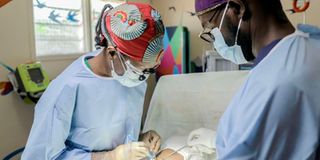On the path to a paediatrics training hub

A surgical team conducting an operation at the paediatric theatre in Kakuma. Kenya Paediatric Fellowship Program seeks to address the acute shortage of childcare sub-specialties through capacity building of local training institutions to offer quality paediatric sub-specialty training programmes.
paediatric specialists, midwives, infants, Africa Paediatric Fellowship Program, Kenya Paediatric Fellowship Program, KPFP, Gertrude’s Children’s Hospital
One in every 20 children in Kenya dies before their fifth birthday from conditions that are preventable and treatable. Mothers are not left out either, with maternal mortality rates at 362 deaths for every 100,000 live births.
These alarming statistics are attributed to shortage and skewed distribution of skilled paediatric specialists and midwives, reducing the survival chances for most children requiring specialised care. By 2019, for instance, only 365 paediatricians were licensed to practise in the country. Of these, only 114 serve the public sector, with only one serving per 100,000 children in public hospitals.
But even more alarming is the lack of paediatric sub-specialists in the public facilities. Those available primarily work in the national referral hospitals and the private sector, mostly in Nairobi County. To provide efficient neonatal, child and adolescent services, it is recommended that the government employ more than 1,000 paediatricians in the public health sector.
Borrowing from the success of the Africa Paediatric Fellowship Program, the Kenya Paediatric Fellowship Program (KPFP) seeks to address the acute shortage of childcare sub-specialties through capacity building of local training institutions to offer quality paediatric sub-specialty training programmes.
Ensure retention
This programme—currently offered by the University of Nairobi, Moi University, Gertrude’s Children’s Hospital and the Aga Khan University—targets paediatricians and nurses working in the public sector. KPFP not only strives to increase the paediatric sub-specialties in the counties, but is also keen to ensure retention of trained personnel in the public sector through post-training mentorship and bonding them to serve in the counties after training.
The KPFP is not only the first step towards resolving the paediatric sub-specialty shortage crisis in the country but also mapping Kenya as a regional training hub. Overall, this will contribute towards achieving the UN Sustainable Development Goal (SDG) No. 3: To ensure healthy lives and promote well-being for all at all ages and the universal health coverage agenda.
The national government need to step in and not only morally support local institutions training these critical medical personnel cadres but also, where possible, provide match funding to support their training.
County governments, which are responsible for strategic workforce planning and performance management, should be more willing to release their staff for training and support them by budgeting and equipping the facilities for optimum utilisation of the skills attained during training.
Ms Mwangi is the programmes manager of the Elma Foundation Grant, training paediatric subspeciality fellows and midwives at the Aga Khan University. [email protected].





